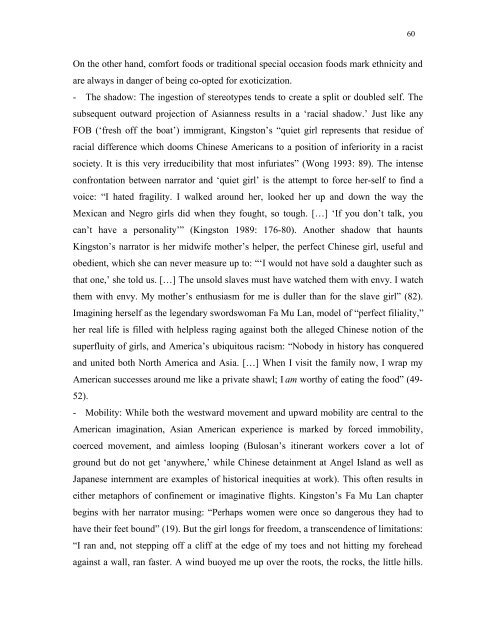A Paradise Lost - KOPS - Universität Konstanz
A Paradise Lost - KOPS - Universität Konstanz
A Paradise Lost - KOPS - Universität Konstanz
You also want an ePaper? Increase the reach of your titles
YUMPU automatically turns print PDFs into web optimized ePapers that Google loves.
On the other hand, comfort foods or traditional special occasion foods mark ethnicity and<br />
are always in danger of being co-opted for exoticization.<br />
- The shadow: The ingestion of stereotypes tends to create a split or doubled self. The<br />
subsequent outward projection of Asianness results in a ‘racial shadow.’ Just like any<br />
FOB (‘fresh off the boat’) immigrant, Kingston’s “quiet girl represents that residue of<br />
racial difference which dooms Chinese Americans to a position of inferiority in a racist<br />
society. It is this very irreducibility that most infuriates” (Wong 1993: 89). The intense<br />
confrontation between narrator and ‘quiet girl’ is the attempt to force her-self to find a<br />
voice: “I hated fragility. I walked around her, looked her up and down the way the<br />
Mexican and Negro girls did when they fought, so tough. […] ‘If you don’t talk, you<br />
can’t have a personality’” (Kingston 1989: 176-80). Another shadow that haunts<br />
Kingston’s narrator is her midwife mother’s helper, the perfect Chinese girl, useful and<br />
obedient, which she can never measure up to: “‘I would not have sold a daughter such as<br />
that one,’ she told us. […] The unsold slaves must have watched them with envy. I watch<br />
them with envy. My mother’s enthusiasm for me is duller than for the slave girl” (82).<br />
Imagining herself as the legendary swordswoman Fa Mu Lan, model of “perfect filiality,”<br />
her real life is filled with helpless raging against both the alleged Chinese notion of the<br />
superfluity of girls, and America’s ubiquitous racism: “Nobody in history has conquered<br />
and united both North America and Asia. […] When I visit the family now, I wrap my<br />
American successes around me like a private shawl; I am worthy of eating the food” (49-<br />
52).<br />
- Mobility: While both the westward movement and upward mobility are central to the<br />
American imagination, Asian American experience is marked by forced immobility,<br />
coerced movement, and aimless looping (Bulosan’s itinerant workers cover a lot of<br />
ground but do not get ‘anywhere,’ while Chinese detainment at Angel Island as well as<br />
Japanese internment are examples of historical inequities at work). This often results in<br />
either metaphors of confinement or imaginative flights. Kingston’s Fa Mu Lan chapter<br />
begins with her narrator musing: “Perhaps women were once so dangerous they had to<br />
have their feet bound” (19). But the girl longs for freedom, a transcendence of limitations:<br />
“I ran and, not stepping off a cliff at the edge of my toes and not hitting my forehead<br />
against a wall, ran faster. A wind buoyed me up over the roots, the rocks, the little hills.<br />
60

















